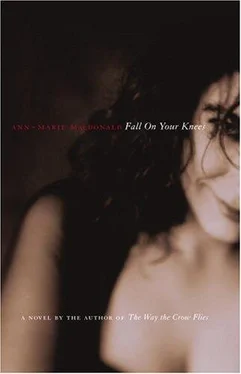In Frances’s room, Mercedes hears the kitchen door slam. She makes a move towards the window but stops when she sees Frances coming awake at the sound. “Frances?”
Frances looks up at Mercedes.
“Frances, it’s time to make you fresh and dry, dear.”
Frances blinks. Mercedes smiles.
“I’ve brought you your favourite dishes. Look.”
Frances looks at the tray while Mercedes identifies its contents, “Blancmange, treacle, mead and mutton —”
“It’s empty.”
“Frances —” Mercedes’ head starts to shake.
“Mercedes, what’s wrong?”
Mercedes’ fingers begin a blind search of her own face, probing her eye sockets — Frances reaches up and gently lowers her hands. Mercedes takes a breath and pulls herself taut. “I’m sorry, I didn’t want him to —” but trembles and cracks all over like spring breakup — “die! — I —” Frances reaches up and draws Mercedes down into an embrace, soaking them both. Mercedes smells the new milk. “I’m sorry, Frances.”
“He died. It’s not your fault.”
Mercedes grieves into Frances’s neck. “Maybe if we had stayed here and let Mrs Luvovitz —”
“Hush,” patting her back. “Hush now, it’s all right.”
Mercedes mangles many words against Frances’s neck, unintelligible to her sister but for “I love you Frances.”
“Shsh.”
“Can I sleep here tonight?”
But Frances is looking past Mercedes’ shoulder out the window. “What’s Lily doing?”
Mercedes looks up.
They can see Lily on her hands and knees in the garden. Somehow she has rolled the big rock aside on her own. There is an object lying nearby — a brighter patch against the ground. Lily is scooping debris from a freshly excavated hole.
“She’s digging,” says Mercedes.
They watch Lily pause and rest for a moment against the garden stone.
“She’s praying,” says Frances.
They see Lily rise from her knees and pick up the dimly glittering bundle. She cradles it for a moment in her arms before lowering it into the hole. Mercedes rises and straightens her shoulders.
“I’m worried about Lily, Frances.”
“Leave her be.”
“You know, Frances, one thing looks very much like another.”
“Mercedes —”
“What kind of a creature prefers to be crippled, Frances? Answer me that.” Mercedes has entered a mad classroom, i before e except after c, the time has come, the Walrus said, to give you forty whacks instead .
“Mercedes, come back.”
But Mercedes has left the room and now she is almost fainting at the evil smell enshrouding the hall. She follows the putrid cloud downstairs and into the darkened kitchen before Lily is halfway across the yard on her way back to the house. Mercedes waits with her hand on the electric light switch, trying not to breathe. One thing looks like another, but nose knows. There is the odour of sanctity. And there is the stench of hell.
The kitchen door opens and Lily steps into the sudden light.
“What have you done?” demands Mercedes.
Lily’s hands are cupped together around a secret. She looks like a child with a robin’s egg, it fell out of the nest, I rescued it, really ’n’ truly .
“I’ve buried Trixie,” Lily says.
Mercedes waits. Gives her one last chance. Lily walks to the kitchen table and deposits her treasure. Blackened with coal, nestled in a remnant of stained linen, a tiny human skull, fragile as a shell, with sutures still agape. Along with a few slender twig and pebble bones, the stuff of birds’ nests.
“And I’ve found my brother.”
She watches as Mercedes gets down on her knees, squeezes shut her eyes and, in a stage whisper, implores God to cast the Devil from Lily — “‘ exorcizo te, immunde spiritus, maledicte diabole ’” — repeating the words until they are no longer words but sounds. She makes the sign of the cross over, and over, and over — Later she will contact the bishop so that Lily may be taken away to a place where a special priest will drive the unclean spirit from her by force of prayer and perhaps other means, cruel to the body but so kind to the soul. Later Mercedes will beg God’s forgiveness for having flattered herself that she was the sister of a saint.
Lily walks past Mercedes, whose mouth is twitching and hissing like a puncture, and into the front room. She is ready to ask James a question. She has already forgiven him for what she does not yet know. The reading lamp is on. She steps through a breach in his wall of books to find him slumped as usual in the wingback chair with his mouth half open. Dante’s Paradiso has fallen from his hands. Lily picks it up and places it carefully in his lap. She bends and kisses his forehead, but she doesn’t ask him the question, because he is dead.
She returns to the hall, where Mercedes’ whispers have risen to a buzz and whirr. Lily mounts the stairs and walks into Frances’s bedroom, full of the scent, the innocent passion of wildflowers.
“Frances, I’ve buried Trixie and said a prayer for her. I’ve found Ambrose.”
Frances says, “Lily, reach up and hand me Wuthering Heights.”
Lily hands Frances the book.
“Remember when we buried the family tree?” asks Frances with a small grin.
“It decayed,” answers Lily. “It was only made of paper.”
“Did you find my nightgown?”
“A little piece of it.”
Frances opens Wuthering Heights . The pages have been excavated in the centre and replaced with a wad of cash. Frances hands Lily the money.
“Is this the Lourdes money?”
“No. I earned it honestly.”
“Daddy is dead.”
“I have a present for you, Lily. I was going to wait for your birthday but I want you to have it tonight.”
“What is it?”
“It’s in the hope chest.”
“Frances —”
“What’s that sound?” Frances tilts her head to listen. “Do you hear that? It sounds like a swarm of —”
“It’s Mercedes. I’m afraid of her.”
“She thinks you’re a saint.”
“Not any more.”
“I know.”
“I don’t believe in the Devil, Frances.”
“Mercedes does.”
“So?”
“I can’t look after you anymore.”
“It’s okay, Frances, I can look after myself, I’m not scared of Mercedes.”
“It’s not just Mercedes. You have to go, Lily. Don’t worry, I’ll tell you where.”
“No.”
Frances cups Lily’s face in her hands and looks her in the eyes. “Oh yes.”
How can a person look into her own face and consent to be banished from it? For Lily, Frances is as first and familiar as the sky, as the palm of her own hand. The freckle on the nose, the green jewels in the eyes, the smart mouth, what does it mean to be banished from the face that first looked you into existence?
“I don’t want to leave you.”
Lily’s forehead buckles but Frances insists, “You have to go, little gingerbread boy, ‘run away and whatever you do, don’t look back.’”
“This isn’t a story, Frances.” Anger ignites Lily’s grief.
“Yes it is, Lily. Hayola kellu bas Helm.”
“It is not!”
“Taa’i la hown, Habibti —”
“No!”
“Te’berini.”
“Stop it!”
Frances reaches for Lily, but Lily flies into a rage, beating off the embrace until she forgets that Frances is not a book, or a porcelain figurine. Frances doesn’t move except to protect her face and breasts while Lily exhausts herself.
When Lily crumples finally, the undertow gets ahold of her face and contorts it into a grieving clown. The same tide distends her voice, “I don’t want to leave you, Fra-anc-ees.” The corners of Lily’s mouth run with clear saliva, she is incapable of closing her mouth or of taking the next breath. Frances touches Lily’s fist, unlocking her throat. The air pours scraping in, and corrosive sobs begin.
Читать дальше












